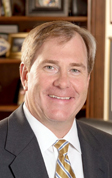When former Speaker of the House Mike Hubbard was convicted on 12 felony counts of corruption, he was immediately removed from office. Now, the state House of Representatives must elect a new speaker.
The state constitution requires legislators to hold a public vote to elect the next speaker, but the reality is that, unless there is a public outcry, the next Speaker of the House will have already been chosen in a private meeting held behind closed doors months before the legislature returns to Montgomery.
At some point in the coming days, the House Republican Caucus will meet to vote on its choice for the next Speaker of the House. Whomever gets the most votes, regardless of how close that internal vote may be, will be the “Caucus” nominee for speaker,” and all Republicans in the state House of Representatives will be required by their caucus bylaws to vote for that person, even if they don’t support them.
Any Republican who votes against the caucus’ nominee could face reprimands, censure and possibly even expulsion from the caucus, not to mention having to face the wrath of the next speaker, who could take away that member’s committee assignments or chairmanships and kill any legislation that member introduces.
If this iron-fisted, no-holds-barred brand of corrupt politics sounds like the kind of thing our former House speaker embraced, it’s because that’s exactly what it is.
On April 6, 2005, former State Rep. Todd Greeson, a Republican from DeKalb County, was formally reprimanded because he voted “yes” on a procedural vote that the Republican Caucus had chosen to vote “no” on, even though every single Republican in the House voted for the bill after that procedural vote had been taken.
That reprimand was written by Mike Hubbard, who was House Minority Leader at the time, on his official state letterhead and signed by 12 members of the Republican Caucus. In the letter, Hubbard wrote that “our members must vote as a bloc” anytime the Republican Caucus takes an official position, and that “abstaining, ‘walking’ or refusing to cast” a vote with the caucus is “tantamount to violating the caucus position.” Mike Hubbard and his leadership team threatened Rep. Greeson that any further violations of the caucus’ bylaws, “could lead to a public Resolution of Censure or possible expulsion.”
While that reprimand was delivered 11 years ago and Mike Hubbard is no longer in the House of Representatives, the Republican Caucus’ bylaws have not changed, and many of the Republicans who signed that letter of reprimand are still in the legislature.
So while Mike Hubbard may not be speaker any more, his influence is still controlling the process to elect his replacement.
There are times when it is appropriate for the Republican and Democratic Caucuses to meet in private and take positions on issues. But the individual members of the caucuses should never be reprimanded for voting against their caucus if it’s in the best interest of the people they represent. And no legislator should be required to vote for a candidate for House Speaker just because their caucus voted to support that candidate.
In our state legislature, the Republicans hold 72 out of 105 seats (they had 73 before Mike Hubbard was convicted), which gives them a supermajority. Their caucus has the votes to elect the next speaker without a single Democratic vote, and that means that unless the Republican Caucus changes its bylaws or enough of its members refuse to be told how they will vote, the next Speaker of the House will be elected behind closed doors at the next House Republican Caucus meeting.
The next Speaker of the House should not be decided by one caucus, and it certainly shouldn’t be decided behind closed doors. There are 4.8 million Alabamians, and they all deserve to be represented in the vote.
The next speaker can be elected by only 37 legislators out of 105, which is less than a third of the members of the house. But that is all it takes to win a majority in the Republican Caucus, and its current bylaws force all 72 Republicans to vote for their caucus’ nominee. The voices of 35 Republicans and 33 Democrats (and the millions of people we represent!) could be silenced because of the House Republican Caucus’ bylaws.
If the House of Representatives want to move past the Mike Hubbard tactics and corruption, we need to start by abandoning his way of doing things and hold the next election for House Speaker in public and with the input of all 105 members of the house.
Craig Ford is a Democrat from Gadsden and the Minority Leader in the Alabama House of Representatives.





